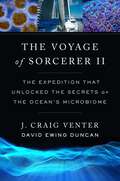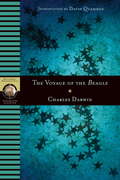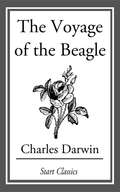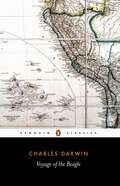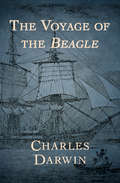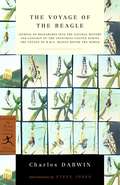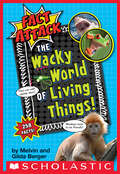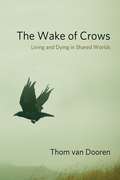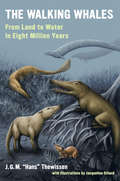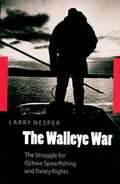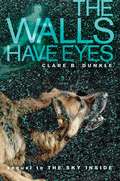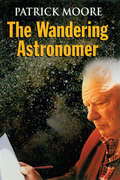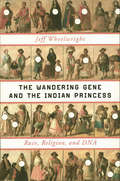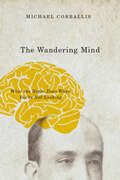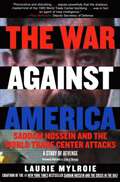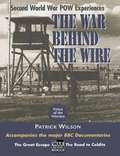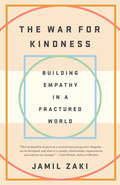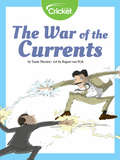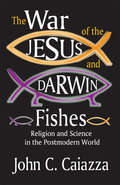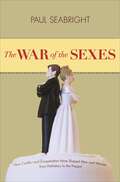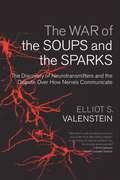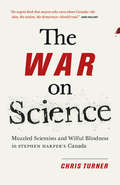- Table View
- List View
The Voyage of Sorcerer II: The Expedition That Unlocked the Secrets of the Ocean’s Microbiome
by David Ewing Duncan J. Craig Venter“Will undoubtedly shape our understanding of the global ecosystem for decades to come.”—Siddhartha Mukherjee, author of The Emperor of All MaladiesA celebrated genome scientist sails around the world, collecting tens of millions of marine microbes and revolutionizing our understanding of the microbiome that sustains us.Upon completing his historic work on the Human Genome Project, J. Craig Venter declared that he would sequence the genetic code of all life on earth. Thus began a fifteen-year quest to collect DNA from the world’s oldest and most abundant form of life: microbes. Boarding the Sorcerer II, a 100-foot sailboat turned research vessel, Venter traveled over 65,000 miles around the globe to sample ocean water and the microscopic life within.In The Voyage of Sorcerer II, Venter and science writer David Ewing Duncan tell the remarkable story of these expeditions and of the momentous discoveries that ensued—of plant-like bacteria that get their energy from the sun, proteins that metabolize vast amounts of hydrogen, and microbes whose genes shield them from ultraviolet light. The result was a massive library of millions of unknown genes, thousands of unseen protein families, and new lineages of bacteria that revealed the unimaginable complexity of life on earth. Yet despite this exquisite diversity, Venter encountered sobering reminders of how human activity is disturbing the delicate microbial ecosystem that nurtures life on earth. In the face of unprecedented climate change, Venter and Duncan show how we can harness the microbial genome to develop alternative sources of energy, food, and medicine that might ultimately avert our destruction.A captivating story of exploration and discovery, The Voyage of Sorcerer II restores microbes to their rightful place as crucial partners in our evolutionary past and guides to our future.
The Voyage of the Beagle
by Charles Darwin David QuammenWhen HMS Beagle sailed out of Devonport on 27 December 1831, Charles Darwin was twenty-two and setting off on the voyage of a lifetime. His journal, here reprinted in a shortened form, shows a naturalist making patient observations concerning geology, natural history, people, places and events. Volcanoes in the Galapagos, the Gossamer spider of Patagonia and the Australasian coral reefs - all are to be found in these extraordinary writings. The insights made here were to set in motion the intellectual currents that led to the most controversial book of the Victorian age: The Origin of Species. Includes introduction by David Quammen and notes.
The Voyage of the Beagle
by Charles Darwin"The Voyage of the Beagle" is a title commonly given to the book written by Charles Darwin and published in 1839 as his "Journal and Remarks", bringing him considerable fame and respect. The title refers to the second survey expedition of the ship HMS Beagle, which set sail from Plymouth Sound on 27 December 1831 under the command of Captain Robert FitzRoy, R.N.. While the expedition was originally planned to last two years, it lasted almost five--the Beagle did not return until 2 October 1836. Darwin spent most of this time exploring on land (three years and three months on land; 18 months at sea). The book, also known as Darwin's "Journal of Researches", is a vivid and exciting travel memoir as well as a detailed scientific field journal covering biology, geology, and anthropology that demonstrates Darwin's keen powers of observation, written at a time when Western Europeans were exploring and charting the whole world. Although Darwin revisited some areas during the expedition, for clarity the chapters of the book are ordered by reference to places and locations rather than by date. Darwin's notes made during the voyage include comments illustrating his changing views at a time when he was developing his theory of evolution by natural selection and includes some suggestions of his ideas, particularly in the second edition of 1845.
The Voyage of the Beagle
by Charles DarwinWhen HMS Beagle sailed out of Devonport on 27 December 1831, Charles Darwin was twenty-two and setting off on the voyage of a lifetime. His journal, here reprinted in a shortened form, shows a naturalist making patient observations concerning geology, natural history, people, places and events. Volcanoes in the Galapagos, the Gossamer spider of Patagonia and the Australasian coral reefs – all are to be found in these extraordinary writings. The insights made here were to set in motion the intellectual currents that led to the most controversial book of the Victorian age: The Origin of Species.
The Voyage of the Beagle: Journal Of Researches Into The Natural History And Geology Of The Countries Visited During The Voyage Of H. M. S. Beagle Round The World
by Charles DarwinThe riveting firsthand account of the historic voyage that led to the theory of evolution When the HMS Beagle set sail in 1831, the science of biology was not far removed from the Dark Ages. When the ship returned to England nearly five years later, Charles Darwin had the makings of a theory that would revolutionize our understanding of the natural world. From volcanoes in the Galapagos to the coral reefs of Australia, The Voyage of the Beagle documents the young naturalist&’s encounters with some of the earth&’s most stunning features. Darwin&’s observations of the people, places, and events he experienced make for compelling reading and offer a fascinating window into the intellectual development of his ideas about natural selection. A brilliant travelogue and a revealing glimpse into the Victorian mindset, The Voyage of the Beagle is an indispensable companion volume to On the Origin of Species. This ebook has been professionally proofread to ensure accuracy and readability on all devices.
The Voyage of the Beagle: Journal of Researches into the Natural History and Geology of the Countries Visited During the Voyage of H.M.S. Beagle Round the World (Modern Library Classics)
by Charles Darwin Steve JonesIn 1831, Charles Darwin embarked on an expedition that, in his own words, determined my whole career. The Voyage of the Beagle chronicles his five-year journey around the world and especially the coastal waters of South America as a naturalist on the H.M.S. Beagle. While traveling through these unexplored countries collecting specimens, Darwin began to formulate the theories of evolution and natural selection realized in his master work, The Origin of Species. Travel memoir and scientific primer alike, The Voyage of the Beagle is a lively and accessible introduction to the mind of one of history's most influential thinkers.From the Trade Paperback edition. Includes and introduction by Steve Jones.
The Wacky World of Living Things! (Fact Attack Ser.)
by Melvin Berger Gilda BergerThis is the first book in a brand-new series featuring TONS of awesomely incredible, weird, and crazy facts!Did you know crickets have ears on their knees? That snakes never close their eyes? Or that no plant has black flowers? Discover these incredible facts and more in the first Fact Attack book, all about plants and animalsFact Attack is an exploration of the most amazing and awe-inspiring plant and animal facts. Heavily designed with different approaches on each page, the style is dynamic, fresh, and in your face. Whether you flip to a page to learn a digestible fact or read it from beginning to end, this is a book a reader will return to time and again.
The Wake of Crows: Living and Dying in Shared Worlds (Critical Perspectives on Animals: Theory, Culture, Science, and Law)
by Thom van DoorenCrows can be found almost everywhere that people are, from tropical islands to deserts and arctic forests, from densely populated cities to suburbs and farms. Across these diverse landscapes, many species of crow are doing well: their intelligent and adaptive ways of life have allowed them to thrive amid human-driven transformations. Indeed, crows are frequently disliked for their success, seen as pests, threats, and scavengers on the detritus of human life. But among the vast variety of crows, there are also critically endangered species that are barely hanging on to existence, some of them the subjects of passionate conservation efforts.The Wake of Crows is an exploration of the entangled lives of humans and crows. Focusing on five key sites, Thom van Dooren asks how we might live well with crows in a changing world. He explores contemporary possibilities for shared life emerging in the context of ongoing processes of globalization, colonization, urbanization, and climate change. Moving among these diverse contexts, this book tells stories of extermination and extinction alongside fragile efforts to better understand and make room for other species. Grounded in the careful work of paying attention to particular crows and their people, The Wake of Crows is an effort to imagine and put into practice a multispecies ethics. In so doing, van Dooren explores some of the possibilities that still exist for living and dying well on this damaged planet.
The Walking Whales: From Land to Water in Eight Million Years
by J. G. ThewissenHans Thewissen, a leading researcher in the field of whale paleontology and anatomy, gives a sweeping first-person account of the discoveries that brought to light the early fossil record of whales. As evidenced in the record, whales evolved from herbivorous forest-dwelling ancestors that resembled tiny deer to carnivorous monsters stalking lakes and rivers and to serpentlike denizens of the coast. Thewissen reports on his discoveries in the wilds of India and Pakistan, weaving a narrative that reveals the day-to-day adventures of fossil collection, enriching it with local flavors from South Asian culture and society. The reader senses the excitement of the digs as well as the rigors faced by scientific researchers, for whom each new insight gives rise to even more questions, and for whom at times the logistics of just staying alive may trump all science. In his search for an understanding of how modern whales live their lives, Thewissen also journeys to Japan and Alaska to study whales and wild dolphins. He finds answers to his questions about fossils by studying the anatomy of otters and porpoises and examining whale embryos under the microscope. In the book's final chapter, Thewissen argues for approaching whale evolution with the most powerful tools we have and for combining all the fields of science in pursuit of knowledge.
The Walleye War: The Struggle for Ojibwe Spearfishing and Treaty Rights
by Larry NesperFor generations, the Ojibwe bands of northern Wisconsin have spearfished spawning walleyed pike in the springtime. The bands reserved hunting, fishing, and gathering rights on the lands that would become the northern third of Wisconsin in treaties signed with the federal government in 1837, 1842, and 1854. Those rights, however, would be ignored by the state of Wisconsin for more than a century. When a federal appeals court in 1983 upheld the bands' off-reservation rights, a deep and far-reaching conflict erupted between the Ojibwe bands and some of their non-Native neighbors. Starting in the mid-1980s, protesters and supporters flocked to the boat landings of lakes being spearfished; Ojibwe spearfisher-men were threatened, stoned, and shot at. Peace and protest rallies, marches, and ceremonies galvanized and rocked the local communities and reservations, and individuals and organizations from across the country poured into northern Wisconsin to take sides in the spearfishing dispute. From the front lines on lakes to tense, behind-the-scenes maneuvering on and off reservations, The Walleye War tells the riveting story of the spearfishing conflict, drawing on the experiences and perspectives of the members of the Lac du Flambeau reservation and an anthropologist who accompanied them on spearfishing expeditions. We learn of the historical roots and cultural significance of spearfishing and off-reservation treaty rights and we see why many modern Ojibwes and non-Natives view them in profoundly different ways. We also come to understand why the Flambeau tribal council and some tribal members disagreed with the spearfishermen and pursued a policy of negotiation with the state to lease the off-reservation treaty rights for fifty million dollars. Fought with rocks and metaphors, The Walleye War is the story of a Native people's struggle for dignity, identity, and self-preservation in the modern world. Larry Nesper an assistant professor of anthropology at the University of Wisconsin-Madison.
The Walls Have Eyes
by Clare B. DunkleMartin may have seen his sister, Cassie, to safety at the end of The Sky Inside, but his adventure is far from over. There's still a totalitarian regime in place, murderous game shows on the air, and a couple of government agents on Martin's tail. When Martin and his AllDog, Chip, go back to his old suburbs to check up on Mom, they get a lot more than they bargained for when they end up escaping with both parents. But the biggest surprise is yet to come--the heart of the government's central power is closer to Martin than he ever suspected.
The Wandering Astronomer
by Patrick MooreDrawing on his vast knowledge and direct experience of most of the key events in astronomy and space exploration during this century, Patrick Moore takes a sideways look at the historical reports and contemporary thought behind a wide range of astronomical topics. The Wandering Astronomer presents his personal accounts of the towering characters of 20th-century astronomy, intriguing facts about puzzling astronomical phenomena, and amusing stories about the quirkier side of astronomy and space exploration. This collection of essays covers everything from the case of vanishing planets to UFOs over Selsey.
The Wandering Gene and the Indian Princess: Race, Religion, and DNA
by Jeff WheelwrightA brilliant and emotionally resonant exploration of science and family history. A vibrant young Hispano woman, Shonnie Medina, inherits a breast-cancer mutation known as BRCA1.185delAG. It is a genetic variant characteristic of Jews. The Medinas knew they were descended from Native Americans and Spanish Catholics, but they did not know that they had Jewish ancestry as well. The mutation most likely sprang from Sephardic Jews hounded by the Spanish Inquisition. The discovery of the gene leads to a fascinating investigation of cultural history and modern genetics by Dr. Harry Ostrer and other experts on the DNA of Jewish populations. Set in the isolated San Luis Valley of Colorado, this beautiful and harrowing book tells of the Medina family's five-hundred-year passage from medieval Spain to the American Southwest and of their surprising conversion from Catholicism to the Jehovah's Witnesses in the 1980s. Rejecting conventional therapies in her struggle against cancer, Shonnie Medina died in 1999. Her life embodies a story that could change the way we think about race and faith.
The Wandering Mind: What the Brain Does When You're Not Looking
by Michael CorballisRooted in neuroscience, psychology and evolutionary biology, this study explores what happens when we stop paying attention and the effect on our behavior.If we’ve done our job well—and, let’s be honest, if we’re lucky—you’ll read to the end of this description. Most likely, however, you won’t. Somewhere in the middle of the next paragraph, your mind will wander off. Minds wander. That’s just how it is.That may be bad news for me, but is it bad news for people in general? Does the fact that as much as fifty percent of our waking hours find us failing to focus on the task at hand represent a problem? Michael Corballis doesn’t think so. With The Wandering Mind, he shows us why, rehabilitating woolgathering and revealing its incredibly useful effects. Drawing on the latest research from cognitive science and evolutionary biology, Corballis shows us how mind-wandering not only frees us from moment-to-moment drudgery, but also from the limitations of our immediate selves. Mind-wandering strengthens our imagination, fueling the flights of invention, storytelling, and empathy that underlie our shared humanity; furthermore, he explains, our tendency to wander back and forth through the timeline of our lives is fundamental to our very sense of ourselves as coherent, continuing personalities.Full of unusual examples and surprising discoveries, The Wandering Mind mounts a vigorous defense of inattention—even as it never fails to hold the reader’s.Praise for The Wandering Mind“[A] conversational, sincere and amusing book about the tendency of our minds to stray from whatever it is we are actually supposed to be focusing on. . . . [An] engaging exploration of the subject.” —Times Higher Education, Book of the Week“Michael Corballis, the scientist, takes you by the hand and weaves through an avalanche of information from psychology, literature, history, and more to elucidate my favorite mental state—mind wandering. His high capacity for erudition, lucidity, and warmth have never shined more brightly.” —Michael S. Gazzaniga“The Wandering Mind is a pleasure to read—a lively book that will appeal to a broad spectrum of readers.” —Thomas Suddendorf, author of The Gap
The War Against America: Study of Revenge
by Laurie MylroieThe destruction of the twin towers of the World Trade Center and the attack on the Pentagon -- all within one hour on September 11, 2001 -- demonstrated America's shocking vulnerability to terrorism.Yet terror had already emerged on America's shores eight years earlier, when the mysterious terrorist mastermind, Ramzi Yousef (arrested after a botched attempt to down a dozen U.S. airlines) bombed the World Trade Center in an attempt to fell the buildings.His attacks were viewed as the harbinger of a new terrorism, carried out by an elusive enemy driven by religious fanaticism to unprecedented hatred of the United States.But is that perception accurate? A real-life detective story, The War Against America engages the reader in a gripping examination of the evidence regarding Yousef and his terrorism. It reveals the split between New York and Washington that emerged during the investigation and tells a terrifying tale of America left exposed and vulnerable following the mishandling of what was once the most ambitious terrorist attack ever attempted on U.S. soil.
The War Behind the Wire: Second World War POW Experiences (Voices of the Veterans)
by Patrick WilsonPublished to coincide with the major 2 part BBC1 series (Autumn 2000) of the same name, War Behind the Wire focuses on the capture, interrogation, the comradeship of camp life, escape planning and forgery techniques, tunnelling, the thrill of life on the run, re-capture and punishment, the joy of liberation. All these experiences and more are vividly described by former POWs of the Second World War and their German camp guards, in War Behind the Wire.Through gripping first-hand accounts enhanced with numerous illustrations, we learn the true story of the ill-fated Great Escape, which ended in the barbaric murder of 50 gallant men of many nationalities. Former inmates tell what life in Colditz Castle was really like.War Behind the Wire is an inspiring book of memories and experiences of those who never gave up hope. These will be as unforgettable for the reader as they were for those who found themselves in captivity.
The War Business: The International Trade in Armaments
by George ThayerAfter the two world wars with security of individual Nations very high, a new business in armaments trade has become a routine. The U.S. government sells armaments to various countries and has become a super power. U.S.S.R. did not lag behind.
The War for Kindness: Building Empathy in a Fractured World
by Jamil Zaki&“In this masterpiece, Jamil Zaki weaves together the very latest science with stories that will stay in your heart forever.&”—Angela Duckworth, author of GritDon&’t miss Jamil Zaki&’s TED Talk, &“We&’re experiencing an empathy shortage, but we can fix it together,&” online now. Empathy is in short supply. We struggle to understand people who aren&’t like us, but find it easy to hate them. Studies show that we are less caring than we were even thirty years ago. In 2006, Barack Obama said that the United States was suffering from an &“empathy deficit.&” Since then, things seem to have only gotten worse. It doesn&’t have to be this way. In this groundbreaking book, Jamil Zaki shares cutting-edge research, including experiments from his own lab, showing that empathy is not a fixed trait—something we&’re born with or not—but rather a skill that can be strengthened through effort. He also tells the stories of people who embody this new perspective, fighting for kindness in the most difficult of circumstances. We meet a former neo-Nazi who is now helping to extract people from hate groups, ex-prisoners discussing novels with the judge who sentenced them, Washington police officers changing their culture to decrease violence among their ranks, and NICU nurses fine-tuning their empathy so that they don&’t succumb to burnout. Written with clarity and passion, The War for Kindness is an inspiring call to action. The future may depend on whether we accept the challenge.Praise for The War for Kindness&“A wide-ranging practical guide to making the world better.&”—NPR&“Relating anecdotes and test cases from his fellow researchers, news events and the imaginary world of literature and entertainment, Zaki makes a vital case for &‘fighting for kindness.&’ . . . If he&’s right—and after reading The War for Kindness, you&’ll probably think so—Zaki&’s work is right on time.&” —San Francisco Chronicle&“In this landmark book, Jamil Zaki gives us a revolutionary perspective on empathy: Empathy can be developed, and, when it is, people, relationships, organizations, and cultures are changed.&”—Carol Dweck, author of Mindset
The War in Outer Space (Tom Swift III, Book #4)
by Victor AppletonWhen Tom builds the marvelous new hyper-drive spacecraft, Exedra, he zooms off to a distant part of the galaxy and a dangerous, challenging adventure. With his friends, Ben and Anita, and his trusty robot, Aristotle, Tom meets a peace-loving but frightened race of insectoids known as the Skree. When Tom Learns that the intelligent Skree are being attacked by a vicious and relentless race of humanoids, the Chutans, he is determined to help them. Tom and his friends face almost certain death as they fight the Chutans to save Earth from destruction!
The War of the Currents
by Tania TherienThomas Edison first developed direct current for New York City, but was challenged by Nikola Tesla, who believed his alternating current was a better solution.
The War of the Jesus and Darwin Fishes: Religion and Science in the Postmodern World
by John C. CaiazzaThis volume's title stems from an observable and seemingly amusing phenomenon--the placement of fish symbols on the rear of automobiles. There are two kinds: one a fish outline with a cross, exhibited by Christians; the other a fish outline filled with the word "evolution," with little legs attached underneath. These symbols manifest the cultural war between religion and science, a clash that draws from nineteenth-century conflicts over evolution roots in the Enlightenment.Today's cultural environment is a result of the internationalization of communication, labor, money, and commerce. This global culture emphasizes tolerance and acceptance of all peoples and traditions, but it also demands a moral and intellectual relativism that rejects "master narratives," including religious tradition as well as scientific theory. In some respects, the postmodern environment is caused by science itself, by the development of postmodern science, its nineteenth-century adversarial stance toward religion now somewhat softened. Among new developments are the historical understanding of science, renewed appreciation of the troubled careers of scientists, and "God" talk among physicists and psychologists. Both science and religion are being overwhelmed by new levels of technology, which is becoming the premier element of contemporary culture.The conflict between science and religion is being resolved in the form of a dynamic. Religion and science are both ways of giving moral and intellectual order to the universe, enabling mankind to cope with a chaotic universe and live well. Both religious critics and scientific researchers have attacked and analyzed pornography, which has become a prominent characteristic of our culture. Both share contemporary sensitivity to individual opinions and protection of the individual from social control. Both science and religion share a sense that postmodern culture lacks structure. Caiazza shows how renewed attention to religious and scientific insights can resolve longstanding conflicts, providing postmodern society with a vision of tolerable order.
The War of the Sexes: How Conflict and Cooperation Have Shaped Men and Women from Prehistory to the Present
by Paul SeabrightHow our stone-age brains made modern society, and why it matters for relationships between men and womenAs countless love songs, movies, and self-help books attest, men and women have long sought different things. The result? Seemingly inevitable conflict. Yet we belong to the most cooperative species on the planet. Isn't there a way we can use this capacity to achieve greater harmony and equality between the sexes? In The War of the Sexes, Paul Seabright argues that there is—but first we must understand how the tension between conflict and cooperation developed in our remote evolutionary past, how it shaped the modern world, and how it still holds us back, both at home and at work.Drawing on biology, sociology, anthropology, and economics, Seabright shows that conflict between the sexes is, paradoxically, the product of cooperation. The evolutionary niche—the long dependent childhood—carved out by our ancestors requires the highest level of cooperative talent. But it also gives couples more to fight about. Men and women became experts at influencing one another to achieve their cooperative ends, but also became trapped in strategies of manipulation and deception in pursuit of sex and partnership. In early societies, economic conditions moved the balance of power in favor of men, as they cornered scarce resources for use in the sexual bargain. Today, conditions have changed beyond recognition, yet inequalities between men and women persist, as the brains, talents, and preferences we inherited from our ancestors struggle to deal with the unpredictable forces unleashed by the modern information economy.Men and women today have an unprecedented opportunity to achieve equal power and respect. But we need to understand the mixed inheritance of conflict and cooperation left to us by our primate ancestors if we are finally to escape their legacy.
The War of the Soups and the Sparks: The Discovery of Neurotransmitters and the Dispute Over How Nerves Communicate
by Elliot ValensteinLike the cracking of the genetic code and the creation of the atomic bomb, the discovery of how the brain's neurons work is one of the fundamental scientific developments of the twentieth century. The discovery of neurotransmitters revolutionized the way we think about the brain and what it means to be human yet few people know how they were discovered, the scientists involved, or the fierce controversy about whether they even existed. The War of the Soups and the Sparks tells the saga of the dispute between the pharmacologists, who had uncovered the first evidence that nerves communicate by releasing chemicals, and the neurophysiologists, experts on the nervous system, who dismissed the evidence and remained committed to electrical explanations.The protagonists of this story are Otto Loewi and Henry Dale, who received Nobel Prizes for their work, and Walter Cannon, who would have shared the prize with them if he had not been persuaded to adopt a controversial theory (how that happened is an important part of this history). Valenstein sets his story of scientific discovery against the backdrop of two world wars and examines the fascinating lives of several scientists whose work was affected by the social and political events of their time. He recounts such stories as Loewi's arrest by Nazi storm troopers and Dale's efforts at helping key scientists escape Germany. The War of the Soups and the Sparks reveals how science and scientists work. Valenstein describes the observations and experiments that led to the discovery of neurotransmitters and sheds light on what determines whether a novel concept will gain acceptance among the scientific community. His work also explains the immense importance of Loewi, Dale, and Cannon's achievements in our understanding of the human brain and the way mental illnesses are conceptualized and treated.
The War on Science
by Chris TurnerA passionate and meticulously researched argument against the Harper government's war on scienceIn this arresting and passionately argued indictment, award-winning journalist Chris Turner contends that Stephen Harper's attack on basic science, science communication, environmental regulations, and the environmental NGO community is the most vicious assault ever waged by a Canadian government on the fundamental principles of the Enlightenment. From the closure of Arctic research stations as oil drilling begins in the High Arctic to slashed research budgets in agriculture, dramatic changes to the nation's fisheries policy, and the muzzling of government scientists, Harper's government has effectively dismantled Canada's long-standing scientific tradition. Drawing on interviews with scientists whose work has been halted by budget cuts and their colleagues in an NGO community increasingly treated as an enemy of the state, The War on Science paints a vivid and damning portrait of a government that has abandoned environmental stewardship and severed a nation.
